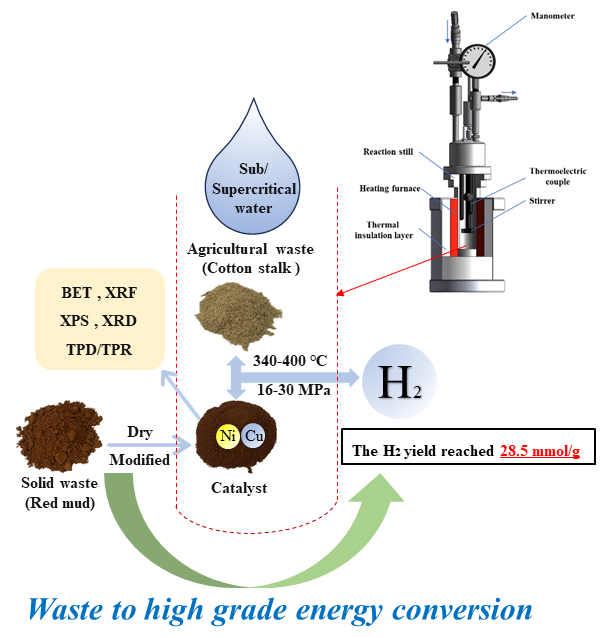水热制氢:Red mud supported Ni-Cu bimetallic material for hydrothermal production of hydrogen from biomass
1 4 月, 2024Red mud supported Ni-Cu bimetallic material for hydrothermal production of hydrogen from biomass
Recently, master student Mr. Gong-xun Xu supervised by Prof. Zhen Fang, collaborated with Dr. S Nanda (Dalhousie University), Profs. AK Dalai (University of Saskatchewan) and Prof. JA Kozinski (Lakehead University published a research article in Industrial Crops & Products about Red mud supported Ni-Cu bimetallic material for hydrothermal production of hydrogen from biomass.
Exploring efficient and reliable catalysts to achieve gasification of biomass waste is a promising research endeavour. In this study solid waste red mud (RM, an inexpensive and efficient support) loaded Ni-Cu metals (Ni-Cu/RM) was used to catalyze hydrothermal gasification of cotton stalk at 340-400 ℃ and 16-30 MPa. In the presence of Ni-Cu/RM catalyst, 21.88 mmol/g H2 yield with 79.89% carbon balance was achieved, increased by 22.8 times under the optimized conditions (380 ℃ for 5 min) based on orthogonal experiments. Under the optimal conditions, H2 yield with neat Ni and Ni/RM loaded on RM is 0.96 and 12.94 mmol/g, respectively due to the specific surface area soaring by 72.0 times from 0.7 to 50.5 m2/g. With Ni-Cu/RM bimetallic catalyst, H2 yield jumped from 3.41 to 21.88 mmol/g, 6.7 times higher than that neat Ni, or reached 84% with Ni-Cu/Al2O3 if Al2O3 was as support. It is further found that Cu promoted the dispersion of Ni on red mud with surface area rising from 50.47 to 73.42 m2/g together with forming Ni-Cu alloy (alkalinity of Ni-Cu/RM rose to 285.65 from 172.21 μmol/g for Ni/RM) enhanced H2 generation. When temperature grew from 340 ℃ (subcritical) to 400 ℃ (supercritical region), H2 yield improved by 3 times from 9.21 to 28.50 mmol/g. Red mud is an ideal candidate for replacing the commercial support Al2O3.
Results were published in Industrial Crops and Products:
GX Xu, S Nanda , JJ Guo, YQ Song, JA Kozinski, AK Dalai, Zhen Fang*, Red Mud Supported Ni-Cu Bimetallic Material for Hydrothermal Production of Hydrogen from Biomass, Industrial Crops and Products (IF 6.4), 212 (2024), 118370. https://doi.org/10.1016/j.indcrop.2024.118370.

Red mud supported Ni-Cu bimetallic material for hydrothermal production of hydrogen from biomass赤泥负载Ni-Cu双金属材料用于生物质水热制氢
赤泥负载Ni-Cu双金属材料用于生物质水热制氢
最近,硕士徐功迅在方真教授的指导下,与加拿大Dalhousie大学助理教授S Nanda博士、Saskatchewan大学 AK Dalai院士和加拿大Lakehead 大学工学院院长JA Kozinski院士在在国际学术期刊Industrial Crops and Products (Q1, IF = 5.9) 发表了一篇题为“赤泥负载Ni-Cu双金属材料用于生物质水热制氢”的研究性论文。
探索高效可靠的催化剂来实现生物质废弃物的气化是一项有前途的研究工作。该研究以负载Ni-Cu金属(Ni-Cu/RM)的固体废赤泥(RM)为载体,在340 ~ 400 ℃、16 ~ 30 MPa条件下催化棉秆水热气化。在Ni-Cu/RM催化剂作用下,优化条件下(380℃、5 min)的H2产率提高22.8倍,达到21.88 mmol/g,碳平衡79.89%。在最优条件下,纯Ni和Ni/RM负载在RM上的H2产率分别为0.96和12.94 mmol/g,比表面积从0.7提高到50.5 m2/g,提高了72.0倍。采用Ni-Cu/RM双金属催化剂时,H2产率从3.41提高到21.88 mmol/g,是纯Ni催化剂的6.7倍;在以Al2O3为载体时,H2产率达到84%。Cu促进了Ni在赤泥上的分散,表面积从50.47增加到73.42 m2/g,并形成了Ni-Cu合金(Ni/RM的Ni-Cu/RM的碱度从172.21提高到285.65μmol/g),促进了H2的生成。当温度从340℃(亚临界)升高到400℃(超临界)时,H2产率从9.21提高到28.50mmol/g,提高了3倍。赤泥是替代Al2O3的理想载体。
结果发表在Industrial Crops and Products:
GX Xu, S Nanda , JJ Guo, YQ Song, JA Kozinski, AK Dalai, Zhen Fang*, Red Mud Supported Ni-Cu Bimetallic Material for Hydrothermal Production of Hydrogen from Biomass, Industrial Crops and Products (IF 6.4), 212 (2024), 118370. https://doi.org/10.1016/j.indcrop.2024.118370.